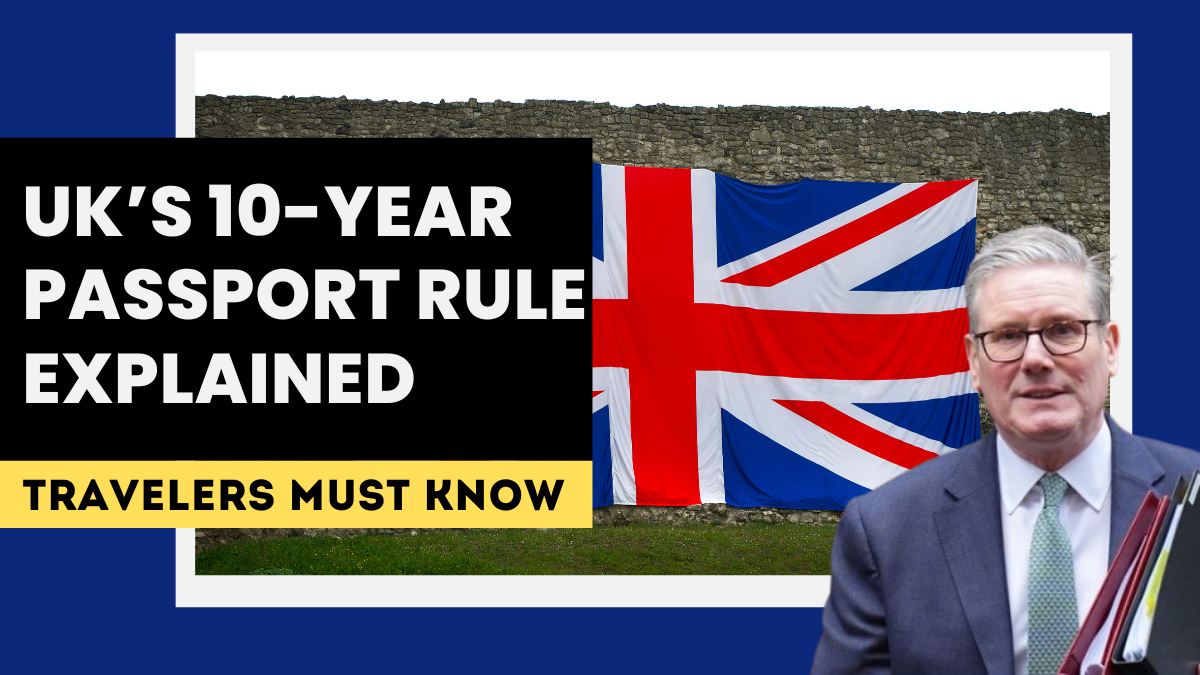Travel rules have always been a key concern for UK holidaymakers, especially those visiting the European Union and other international destinations. In 2025, the 10-year passport rule continues to be one of the most important requirements for travelers to understand. Failing to comply with this rule could mean being denied boarding at the airport or refused entry into your destination country.
The rule has been in place for several years, but confusion still exists around what it means for travelers, especially after Brexit. With new changes to border checks and electronic travel authorizations, the 10-year passport validity rule is now more strictly enforced than ever.

What Is the 10-Year Passport Rule?
The 10-year passport rule means that UK passports are only valid for 10 years from the date of issue. Even if extra months were added to a passport’s expiry date (as was previously allowed before 2018), they are no longer considered valid beyond the 10-year mark.
For example, if your passport was issued in June 2015 and has an expiry date of December 2025, you cannot travel using it after June 2025. Airlines and border officials will treat the passport as expired once it reaches the 10-year anniversary of issuance.
Why Is the Rule Important in 2025?
Since Brexit, the UK is no longer part of the European Union, and UK travelers must comply with the same entry rules as other non-EU nationals. The 10-year rule is enforced by most EU and Schengen Area countries, as well as other destinations worldwide.
With stricter border checks and the rollout of the EU’s new ETIAS (European Travel Information and Authorization System), having a passport that complies with validity rules is critical. The enforcement of the rule ensures security, prevents fraud, and aligns the UK with international travel standards.
Key Requirements Travelers Must Know
Travelers in 2025 must keep the following in mind regarding the 10-year passport rule:
-
Valid for 10 years only: Passports cannot be used past their 10th anniversary, regardless of expiry date.
-
Entry requirements: Many destinations, including the EU, require passports to be valid for at least 3 to 6 months beyond the date of entry.
-
Children’s passports: These are only valid for 5 years and must also comply with minimum validity requirements.
-
No grace period: Airlines will refuse boarding if your passport is even a day past the 10-year issue date.
This means travelers must check both the issue date and the expiry date before booking international trips.
How to Check If Your Passport Is Valid
To avoid problems at the airport, travelers should always check two dates:
-
Date of issue – passports older than 10 years are invalid, even if they appear “in date.”
-
Date of expiry – ensure the passport has at least 3–6 months left, depending on destination requirements.
For example, if a passport was issued on April 10, 2015, it will no longer be valid for travel after April 10, 2025, even if the printed expiry date is later.
What Happens If You Travel With an Invalid Passport?
If your passport exceeds the 10-year limit, airlines will not allow you to board. Even if you manage to board, immigration authorities at your destination will refuse entry. This could mean being sent back to the UK at your own expense.
Travel insurance generally does not cover costs resulting from invalid documents, so the financial risk falls entirely on the traveler.
How to Renew Your Passport in Time
The UK Home Office recommends renewing passports at least six months before travel if you are close to the 10-year mark. Renewals can be done online or by post, with standard processing times ranging from 3 to 10 weeks depending on demand. For urgent travel, fast-track services are available at a higher fee.
Checking validity well ahead of planned travel ensures peace of mind and avoids last-minute disruptions.
Key Takeaways
The UK 10-Year Passport Rule 2025 is a strict travel requirement that all British travelers must follow. Passports are valid for 10 years from the date of issue, regardless of the expiry date shown. With post-Brexit travel checks and the introduction of ETIAS, compliance with the rule is more important than ever.
For holidaymakers, the message is clear: always check your passport’s issue date before booking trips. Renew early, plan ahead, and avoid unnecessary stress at the airport.
FAQs
What is the 10-year passport rule in the UK?
It means UK passports are only valid for 10 years from the date of issue, regardless of the printed expiry date.
Does the 10-year rule apply to children’s passports?
Children’s passports are only valid for 5 years, so the 10-year rule does not apply, but minimum validity still matters.
Can I travel if my passport shows it expires in 2026 but was issued in 2015?
No, the passport would be invalid from 2025 because it cannot be used more than 10 years after issue.
How early should I renew my passport?
The UK Home Office advises renewing at least six months before travel if your passport is nearing the 10-year limit.
Will airlines let me board with a passport over 10 years old?
No, airlines will deny boarding if your passport is even a day older than 10 years from its issue date.
Click here to know more.
